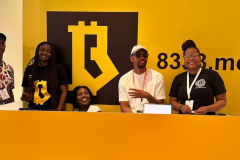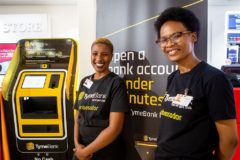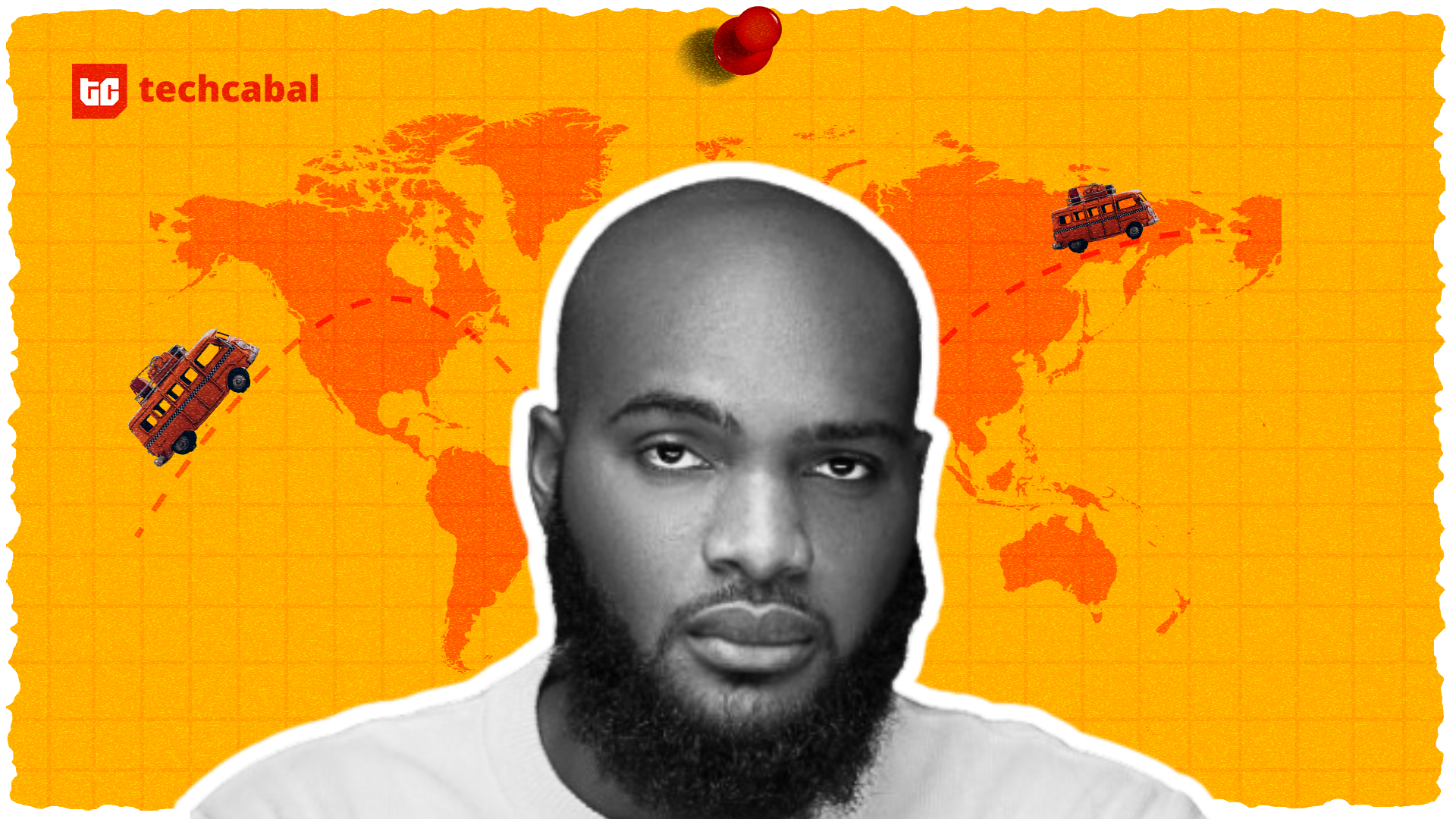David Ukauwa, a UK-based senior product designer at event hosting company Grip Events, likes to try his hand at different things: experimenting with design styles, illustration, photography, videography, and high-speed cars.
Back in Nigeria, he was part of an exclusive car club in Lagos that lived for the thrill of the road. They hosted a fashion rave called Revs and Runway, which combined the grandeur of fashion exhibitions with the edgy, rebellious display of stunt drivers who loved to impress a crowd with their showmanship.
“I could have a problem with my car, and I’m stuck on the Third Mainland bridge,” said Ukauwa, “And I’ll make a phone call. Before you know it, three bikers are driving toward me, and asking, ‘What do you need?’ Almost everybody is a mechanic, and they’re bringing parts for me to fix my car.”
But in London, where he now lives, he has never found that same drive to take on the steering wheel.
“Taxing in the UK is really weird,” he said. “I live in the central part of London. If you’re driving in a petrol or diesel car, you pay taxes for emissions. These are part of the zonal taxes you pay in central London and other zones 2 and 3 because the city officials want to keep these places uncongested.”
Between congestion charges and emissions fees that stack up to £27.5 ($36) a day, driving in London feels less like a convenience and more like an expensive habit. That might explain why electric vehicles (EVs) have been flying off dealership lots—381,970 units sold in 2024 alone—shrinking the market for petrol and diesel cars. But that EV boom could hit the brakes on April 1, when the UK will start taxing electric and zero-emission vehicles, too.
Not that it bothers Ukauwa much. He’s not a fan of EVs and works from home, even though his company’s office is just a few town-skips away. His odds of survival are pretty high. Throw in another revelation that he’ll be leaving London for Manchester soon, I thought the city had already done a fine job of pushing him out.
From Lagos to London
In 2022, Ukauwa left Nigeria for the UK through the Global Talent Visa opportunity offered by Tech Nation. London wasn’t his first choice when he wittingly chose a life outside Nigeria, but for now, that’s where he’s nested.
“A part of me wished I didn’t get the visa,” said Ukauwa. “I gave in to peer pressure because all my friends were leaving Nigeria on the Global Talent Visa, and I didn’t want to be left out.”
Ukauwa’s journey goes back to his campus days at the University of Lagos, Nigeria, where he studied Computer Science, though he’d always wanted to be an artist. His choice of study was a rebellious move against his father, who wanted him to become a petroleum engineer. Now, he keeps his artist dreams alive by making slapdash illustration pieces every four months.
Shortly after getting into college in 2015, Ukauwa got his first design job at Hotels.ng. He describes this role as a springboard that took him where he truly wanted to go.
“Hotels.ng was like an incubator experience for me,” said Ukauwa. “It didn’t feel like work. I shared a fence with the office, but I was often late. All my boss wanted was to get the work done, and I could do whatever I wanted.”
After leaving the company in 2019, Ukauwa says he worked remotely with US companies from his Lagos bedroom apartment until the Global Talent Visa breakthrough came.
Nomad life, nomad struggles
The nomad life is the high-flyer life, Ukauwa told me. He’d just returned from his last trip to Malaysia in February, which he said changed him; it made him more courteous, and he started introducing ‘please’ and ‘thank you’ into his mannerisms.
Yet, there’s a gnawing homesickness to living alone abroad. It’s similar to the classic analogy of the sun and its shadow—you cannot have one without the other.
When Ukauwa came to London, he struggled to fit in because it was harder to self-identify with anything.
“You feel at ease when you’re home,” he says.
However, he has found a community of 20 friends—most of whom he met for the first time in the UK—and now splits his time between London and Manchester, where he visits them.
As a small band of friends, they do everything together, from travel, hangouts, and experimenting with work trends to sharing craft tricks in photography, as well as other interests. A past trip to and from Morocco cost £50 ($65) which is around ₦100,000—cheaper than a flight from Lagos to Abuja. However, expenses rise with accommodation and food, he explains. On average, Ukauwa says he spends £1,000 ($1,300) traveling within Europe or to Africa.
“It’s not as expensive as people think once you’re out of Nigeria,” he said. “My biggest blocker to get access to this travel life was living in Nigeria,” he added. “It was hard to get visas and cheap flights. But that isn’t the case anymore. It’s a lot easier now.”
Although Ukauwa travels five times a year, his trips are mostly spontaneous, with a little planning in between when he travels with friends. The most difficult thing about travelling while working, according to him—and frankly an honest submission—is finding the zeal to work while away “chilling.”
“I could be at a beach in Barcelona, and I still have to work. That’s the real struggle. Timezones are never a problem for me because, thankfully, I work asynchronously and I’m flexible in the way I work,” he said.
To cope with his struggle, he now travels light. When selecting an Airbnb in a new city, he ensures it has a dedicated workspace with a desk and chair that allows him to comfortably sit at his computer. Planning also helps. He sets aside dedicated time for both work and play, making sure not to mix the two.
There are jobs in stock for designers abroad
In the course of his six-year experience working professionally as a product designer, Ukauwa’s income has grown with his skill level. At Grip Events—where he currently works remotely in the UK—he earns a six-figure income.
This progression has allowed him to afford a lifestyle that includes travelling five times a year. The next destination on his bucket list is either Montenegro or Croatia, which he’s visiting with a few friends in the coming weeks.
Beyond the high-flyer lifestyle, Ukauwa says he travels for design inspiration. He backs this up with an anecdote that he calls his belief system: creatives are as good as the environments they’re exposed to.
“I’ve gotten a lot of inspiration from experiencing different cultures,” he said. “There’s always this one-week or two-week high that you get when you come back from somewhere. It could be derived from the things you saw. It could even be architecture, the way people interact, or how other top designers in those new places think and treat design there.”
Grip Events, where he works, has also played a huge role in his connoisseur-like taste for experiencing travel life. Global mobility is key to how it supports its workers. As a B2B events platform, the company sends its workers to different parts of the world—particularly in the Americas and Asia—for top events where it showcases its product.
Although his role is more product-focused, he has joined the team on a few trips. Still, he laughs and says he’s nowhere near being the public face of the company, so he doesn’t need to travel on its behalf very often.
Global mobility is one of the key perks that Ukauwa looks out for when he applies to work at any company. Location independence and in-house support for asynchronous communication are other perks that Ukauwa looks for. He says he has only been to the office four times since he joined Grip Events 20 months ago, despite the company’s headquarters being located in the same city he’s based in. The cynical side of me chalked up his non-indulgence to the fact that he holds a senior position at the company.
But Ukauwa disproves this.
“That’s just how we work. They know I don’t like meetings. As much as possible, I try to avoid it. My colleagues leave me messages and they’re sure I’ll get it done. Even as a team lead, I like to communicate asynchronously,” he said.
He has always preferred the noncommittal approach to meetings since he started working remotely. Yet, he has been incredibly lucky with his choice of employers. His former employer, PingPong had a strict no-meeting policy before it got acquired by Grain in 2022.
He also adds that there are so many firms in the UK offering mobility perks like Grip Events. The good part, he says, is that there are jobs in stock for skilled product designers who want to try their hands in the global job market.
“Obviously, it’s a lot easier to get these jobs when you’re outside Nigeria. But the thing is, these folks want to employ more Nigerians because we do excellent work,” Ukauwa said.
Ukauwa says that while coming to the UK won’t automatically put jobs on a designer’s plate—because they still have to apply for competitive roles in design—leaving the country peels off one layer of complexity for Nigerians looking to improve their employment options.




















